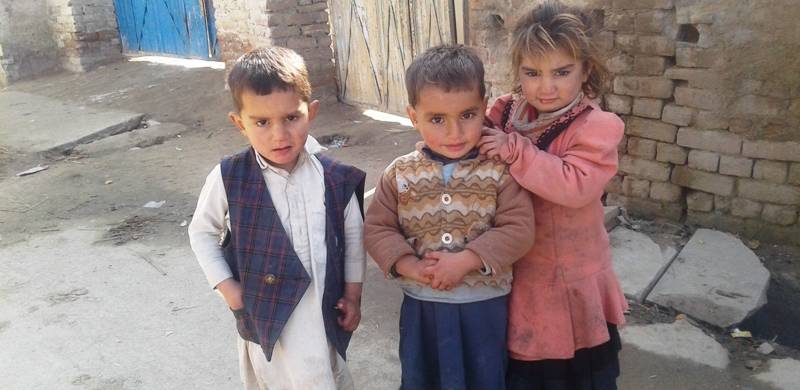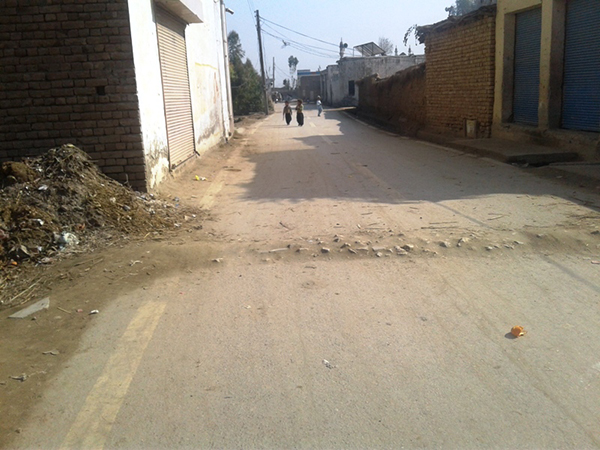
PESHAWAR: Having a road that connects the village to the main GT Road is something of a blessing for villagers in Kotrapan but they face other issues just as immediate - such as scarcity of drinking water, endless electricity outages, lack of education and healthcare facilities.
Among the people of the village, disenchantment in relation to local government institutions is widespread, even when they agree that they have benefited from the road constructed in the area. "We now go to schools and hospitals smoothly. The hospital is far from our village," says one villager in Kotrapan.
they say the government is unable to provide them basic facilities of life. "There is no basic health unit in the area due to which people have to go to cities for treatment," says a villager in Kotrapan. "We need more schools because the one in the village is small whereas the number of children who should be potentially going to school is rising. The boys need a middle school and the girls a primary school."

“Due to the absence of girls’ school here, my daughters could not continue education because other schools are outside the area," says a villager. "We live here and I cannot let her go that far because it is not safe for a child to go too far from home."
Villagers here speak of frequent electricity outages. "There is no transformer here in our village council which deprives us of regular electricity supply," says one villager. "The local government has been unsuccessful in solving the issue despite our frequent appeals to look into the matter."
The village council of Kotrapan, based in Union Council Bara Banda in district Nowshera, has a population of 7000 people, as per the villagers. A majority of the people here are not aware of citizens’ engagement in local government. Only one villager, a businessman, says he participates in development planning process and that is because he is a member of a political party and therefore more aware and motivated than the average villager.
When asked how to strengthen citizens' engagement in decision making process, the villagers favour direct participation claiming that it would be "more useful." Others prefer indirect participation.
Hardly anyone here knows about the Right to Information (RTI) act, which allows citizens the access to development related planning, process and funding, ensuring transparency and accountability on part of local government functionaries.
Only one villager who knows about it is a political worker. He says he often visits the Nazim’s office and it is there where he first heard about the RTI act. However, since a majority of the villagers do not participate in the governance process or development planning, their knowledge of it is patchy at best.
A villager here says, "Development work is undertaken to satisfy politicians. MPAs and MNAs benefit from them. They [local government functionaries] avoid ‘lower class people’."
According to villagers here, women are not included in the policymaking process. "If we (men) are not included in policymaking process then who is going to ask women," says one man. Men are more mobile and visible in the public domain than women, who due to patriarchy and conservative outlook of the population remain restricted to the private sphere.
He suggests that including men is "the first priority if such things [development planning] happens." At the same time he says women should also be included in the policymaking process. Others here oppose women's engagement claiming that policymaking is not women's concern.
The inhabitants of Kotrapan, Nowshera are not aware of citizens’ engagement in local government.
Among the people of the village, disenchantment in relation to local government institutions is widespread, even when they agree that they have benefited from the road constructed in the area. "We now go to schools and hospitals smoothly. The hospital is far from our village," says one villager in Kotrapan.
they say the government is unable to provide them basic facilities of life. "There is no basic health unit in the area due to which people have to go to cities for treatment," says a villager in Kotrapan. "We need more schools because the one in the village is small whereas the number of children who should be potentially going to school is rising. The boys need a middle school and the girls a primary school."

“Due to the absence of girls’ school here, my daughters could not continue education because other schools are outside the area," says a villager. "We live here and I cannot let her go that far because it is not safe for a child to go too far from home."
Villagers here speak of frequent electricity outages. "There is no transformer here in our village council which deprives us of regular electricity supply," says one villager. "The local government has been unsuccessful in solving the issue despite our frequent appeals to look into the matter."
The village council of Kotrapan, based in Union Council Bara Banda in district Nowshera, has a population of 7000 people, as per the villagers. A majority of the people here are not aware of citizens’ engagement in local government. Only one villager, a businessman, says he participates in development planning process and that is because he is a member of a political party and therefore more aware and motivated than the average villager.
When asked how to strengthen citizens' engagement in decision making process, the villagers favour direct participation claiming that it would be "more useful." Others prefer indirect participation.
Hardly anyone here knows about the Right to Information (RTI) act, which allows citizens the access to development related planning, process and funding, ensuring transparency and accountability on part of local government functionaries.
Only one villager who knows about it is a political worker. He says he often visits the Nazim’s office and it is there where he first heard about the RTI act. However, since a majority of the villagers do not participate in the governance process or development planning, their knowledge of it is patchy at best.
A villager here says, "Development work is undertaken to satisfy politicians. MPAs and MNAs benefit from them. They [local government functionaries] avoid ‘lower class people’."
According to villagers here, women are not included in the policymaking process. "If we (men) are not included in policymaking process then who is going to ask women," says one man. Men are more mobile and visible in the public domain than women, who due to patriarchy and conservative outlook of the population remain restricted to the private sphere.
He suggests that including men is "the first priority if such things [development planning] happens." At the same time he says women should also be included in the policymaking process. Others here oppose women's engagement claiming that policymaking is not women's concern.
The inhabitants of Kotrapan, Nowshera are not aware of citizens’ engagement in local government.
